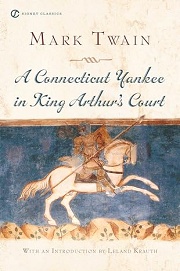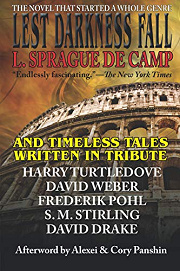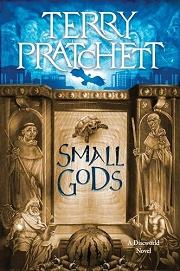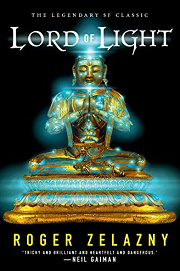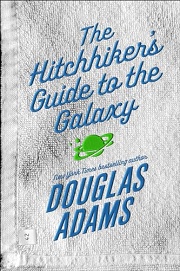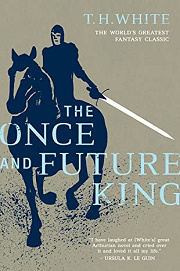Share your thoughts in a quick Shelf Talk!
A Connecticut Yankee In King Arthur's Court by Mark Twain
A sharp-witted American tinkerer wakes up in Camelot—and proceeds to flip chivalry on its head with the power of ingenuity. Satirical, swift, and surprisingly modern, A Connecticut Yankee In King Arthur's Court skewers tradition while delivering a rollicking time-travel adventure.
Have you read this book? Share what you liked (or didn’t), and we’ll use your answers to recommend your next favorite read!
Love A Connecticut Yankee In King Arthur's Court but not sure what to read next?
These picks are popular with readers who enjoyed this book. Complete a quick Shelf Talk to get recommendations made just for you! Warning: possible spoilers for A Connecticut Yankee In King Arthur's Court below.
In A Connecticut Yankee In King Arthur's Court, did you enjoy ...
... a modern tinker's time-stranded overhaul of an ancient society?
Lest Darkness Fall by L. Sprague de Camp
If Hank Morgan’s eclipse gambit, telegraph schemes, and factory-building had you grinning, you’ll love watching Martin Padway land in 6th‑century Italy and try to stave off the Dark Ages with distillation stills, a printing press, and an improvised semaphore network. Like Hank styling himself “The Boss” and outfoxing Merlin, Padway leverages practical know‑how to outmaneuver warlords and clergy—only this time the target is Ostrogothic Rome. It’s the same delightful blend of can‑do engineering, fish‑out‑of‑water wit, and butterfly‑effect meddling that powers A Connecticut Yankee in King Arthur’s Court.
... razor-edged satire of organized religion and authority wrapped in a comic adventure?
Small Gods by Terry Pratchett
Twain’s gleeful jabs at medieval church power—Hank’s clashes with clerics, inquisitorial threats, and the moral gut‑punch of the finale—find a sharp, funny echo in Small Gods. Here, the god Om is stuck as a tortoise, and only a naive novice, Brutha, can hear him. As they tangle with a ruthless theocracy, you’ll get the same bracing mix of laughs and heresy you enjoyed when “The Boss” punctured priestly pretensions in Camelot, but with Pratchett’s comic precision and a surprisingly humane punch.
... technology wielded as 'miracles' to upend a theocratic hierarchy?
Lord of Light by Roger Zelazny
If Hank making lightning, gunpowder, and telegraphs look like sorcery to outshine Merlin was your jam, Lord of Light turns that notion mythic. On a colonized world, godlike rulers enforce a pseudo‑Hindu pantheon with advanced tech disguised as miracles, until the rebel Sam (a.k.a. Mahasamatman) fights to break their stranglehold. It’s the same thrill of unmasking ‘magic’ with science that powered Hank’s electrified-fence showdown—only broadened into a visionary, philosophical revolt.
... deadpan, idea-dense comedic skewering of societal absurdities?
The Hitchhiker's Guide to the Galaxy by Douglas Adams
Loved Hank’s sardonic asides, his cockeyed PR stunts as “Sir Boss,” and the way Twain punctured courtly nonsense with punchline‑precision? Adams delivers that same laugh‑per‑page audacity—just swap Camelot’s bureaucracy for galactic red tape. From Vogon demolition notices to a depressed robot, The Hitchhiker’s Guide to the Galaxy channels the snappy, self‑aware humor you enjoyed when Hank narrates jousts, quests with Sandy, and medieval pageantry as if he’s reviewing a botched factory rollout.
... a clear-eyed dismantling of chivalry and feudal injustice in Arthur’s Britain?
The Once and Future King by T. H. White
If what stuck with you was Hank’s crusade against serfdom, his education schemes, and Twain’s insistence that chivalry masks cruelty, The Once and Future King is a rich companion. White follows Wart (young Arthur) as Merlyn tutors him—often by transforming him into animals—to understand how power should serve the vulnerable. When Arthur tries to build a kingdom of “might for right,” you’ll hear the same arguments Hank makes before that grim, mechanized final battle—only cast in lyrical, bittersweet myth.
Unlock your personalized book recommendations! Just take a quick Shelf Talk for A Connecticut Yankee In King Arthur's Court by Mark Twain. It’s only a few questions and takes less than a minute.
